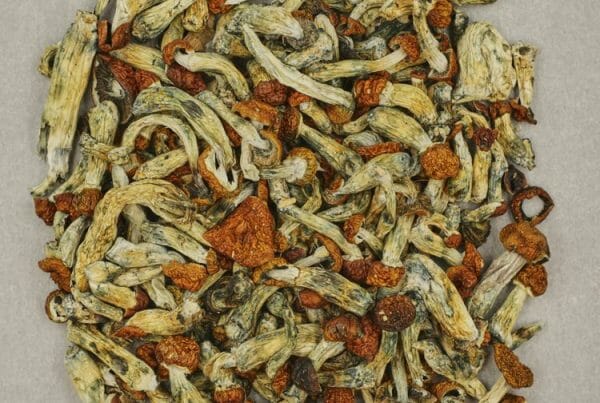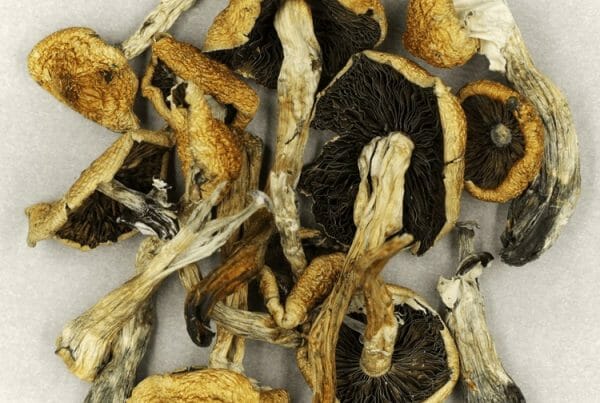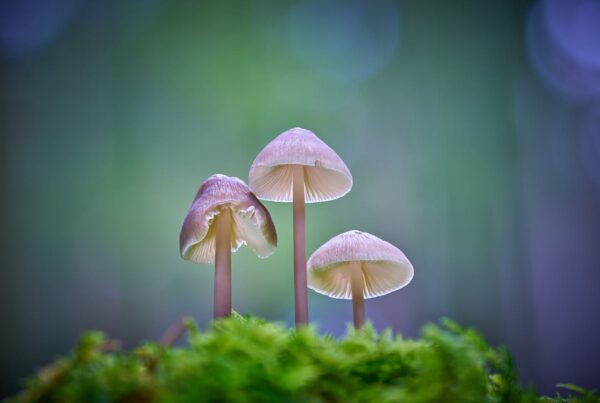World Health Organization (WHO) reports that over 264 million people suffer from depression worldwide.
Though effective for some, traditional treatments often fall short in addressing the complex nature of this condition. This reality has led to a growing interest in alternative therapies, and one such approach has captured both scientific curiosity and public attention: the use of psilocybin-containing mushrooms from a mushroom dispensary for the treatment of depression.
Let us delve into the world of mushroom dispensaries, their role in treating depression, and the compelling statistics that underscore their potential to revolutionize how we address this pressing global mental health challenge.
Table of Contents
- Key Takeaways:
- Understanding Psilocybin and its Therapeutic Potential
- Magic Mushroom Dispensaries Offers Promising Results For Depression
- The Role of Magic Mushroom Dispensary in Treating Depression
- How to Explore Psilocybin Therapy Through A Mushroom Shop
- Conclusion
- Frequently Asked Questions
- How do I find a reputable mushroom dispensary for depression treatment?
- How long does the therapeutic effect of psilocybin therapy last in treating depression?
- Is psilocybin therapy a standalone treatment for depression, or should it be combined with other therapies?
- What other magic mushroom products can I try for depression?
Key Takeaways:
- Mushroom dispensaries offer alternative treatments for depression using psilocybin-containing mushrooms.
- Research suggests that psilocybin can produce substantial and sustained reductions in depressive symptoms.
- Psilocybin therapy is part of a growing movement reshaping mental health care

Understanding Psilocybin and its Therapeutic Potential
Psilocybin is a naturally occurring compound found in certain mushroom species, often called “magic mushrooms.” When ingested, psilocybin is metabolized by the body into psilocin, which interacts with the brain’s serotonin receptors. This interaction is responsible for the profound changes in perception, mood, and consciousness commonly associated with psilocybin use.
Research into the therapeutic potential of psilocybin in treating depression has yielded compelling results. Clinical trials and studies have shown that a single, carefully administered dose of psilocybin can produce significant reductions in depressive symptoms. Patients report transformative and long-lasting effects on their mental health and overall well-being.
These findings have led to increased interest and investment in exploring psilocybin as a novel treatment option for depression, especially for individuals who have not responded well to conventional therapies.
Magic Mushroom Dispensaries Offers Promising Results For Depression
Magic mushrooms, scientifically known as psilocybin-containing mushrooms, have garnered considerable attention for their potential to alleviate depression. Let us explore some types of magic mushrooms and their potential benefits in alleviating depression
| Magic Mushroom | Description | Benefits to Depression |
| Golden Teacher | A well-known psilocybin mushroom with a golden cap. | May lead to reduced depressive symptoms and increased emotional well-being. Can promote introspection and self-reflection, potentially helping individuals gain new perspectives on their depression. Some users report feelings of interconnectedness and unity, which can counter feelings of isolation often associated with depression |
| Psilocybe Cubensis | One of the most common magic mushroom species. | Reported to induce positive changes in mood and outlook on life. May enhance emotional processing and help individuals confront underlying issues contributing to their depression. The altered state of consciousness may allow users to break free from rigid thought patterns and develop a more optimistic mindset |
| B+ | Named for its large, bulbous fruiting bodies. | Can potentially bring about profound and lasting improvements in depressive symptoms. Users often describe experiencing a sense of clarity and understanding about their emotions and life circumstances. The therapeutic experience may aid in releasing pent-up emotions and trauma, providing relief from depression |
| Liberty Cap | Small, conical mushrooms found in various regions. | Known to produce intense emotional experiences that may positively impact depression. Users report heightened sensitivity and empathy during Liberty Cap trips, which can foster emotional healing and connection. The vivid and immersive nature of the psychedelic experience may help individuals gain insights into the root causes of their depression |
| Penis Envy | Notable for its unique, phallic-shaped appearance. | Has been associated with profound insights and shifts in depressive thought patterns. Users often describe feelings of ego dissolution, allowing them to confront their depression without the constraints of their usual identity. The intensity of the experience may catalyze therapeutic breakthroughs, leading to long-lasting improvements in mental health. |
| Blue Meanie | A potent strain known for its bluish appearance. | Believed to have a calming and soothing effect on the mind, potentially reducing anxiety and depressive symptoms. Users have reported experiencing inner peace and emotional release during Blue Meanie trips, which may contribute to improved mental well-being. The gentle yet introspective nature of this strain can be particularly suitable for those seeking a milder psychedelic experience for therapeutic purposes. |
The Role of Magic Mushroom Dispensary in Treating Depression
Magic mushroom shops, also known as magic mushroom dispensaries, play a pivotal role in treating depression, which offers a controlled and regulated environment for individuals seeking potential therapeutic relief.
The Role of Health Canada
In Canada, Health Canada is the federal agency responsible for regulating the safety, efficacy, and quality of therapeutic products, including substances like psilocybin found in magic mushrooms.
Approved Therapeutic Products
Health Canada has recently granted exemptions and approvals for using psilocybin in particular clinical and research settings for specific medical conditions, including depression. This shift in policy reflects a growing recognition of the potential therapeutic uses of psilocybin.
Potential Therapeutic Uses
Magic mushroom stores offer individuals with depression a potentially alternative and promising therapeutic avenue. Under certain circumstances and with proper authorization, individuals may access psilocybin therapy to alleviate depressive symptoms.
Controlled and Regulated Environment
Magic mushroom dispensaries provide a controlled and regulated environment for individuals seeking psilocybin therapy. This ensures that the experience is safe and conducted under the supervision of trained professionals.
Compliance with Health Canada Regulations
Dispensaries must adhere to Health Canada’s regulations and guidelines when providing psilocybin-containing products for therapeutic use. They play a critical role in maintaining compliance and ensuring that therapy is conducted responsibly and ethically.
How to Explore Psilocybin Therapy Through A Mushroom Shop
Exploring psilocybin therapy through a mushroom shop can be a transformative and potentially beneficial experience, but it’s essential to approach it responsibly and with caution. Here are some tips on navigating this process:
- Research Extensively: Begin by thoroughly researching psilocybin therapy and the specific mushroom shop you plan to visit.
- Seek Professional Guidance: Before considering psilocybin therapy, consult a mental health professional or therapist experienced in psychedelic-assisted therapy. They can help assess your suitability for this treatment and provide valuable insights.
- Choose a Reputable Shop: Look for reviews, recommendations, and evidence of compliance with local regulations.
- Understand the Process: Familiarize yourself with the entire therapy process, from preparation and the psychedelic experience to integration afterward. Knowing what to expect can reduce anxiety and enhance the therapeutic outcome.
- Prepare Mentally and Emotionally: Prepare yourself mentally and emotionally for the experience. Set clear intentions for your therapy session, and be ready to confront any challenging emotions or thoughts that may arise.
- Ensure a Safe Environment: Verify that the mushroom shop provides a safe and comfortable environment for your therapy session. This includes appropriate lighting, music, and the presence of trained facilitators who can assist you if needed.
- Follow Dosage Guidelines: Adhere to recommended dosages from the mushroom shop or your healthcare professional. Avoid self-medicating or taking unknown substances, as this can be dangerous.
Conclusion
Mushroom dispensaries offering psilocybin therapy have emerged as a promising alternative to treating depression. While the legal and regulatory landscape surrounding these establishments varies, a growing body of research and real-world accounts highlight their potential to alleviate depressive symptoms and provide individuals with new perspectives on their mental health.
As the field of psychedelic-assisted therapy continues to evolve, the role of mushroom dispensaries in transforming the landscape of depression treatment offers hope to those seeking innovative solutions for their mental well-being.
Frequently Asked Questions
How do I find a reputable mushroom dispensary for depression treatment?
Finding a reputable mushroom dispensary involves thorough research. Look for establishments that comply with local regulations and safety guidelines. Seek recommendations from healthcare professionals or individuals who have had positive experiences. Verify the dispensary’s credentials, such as the qualifications of their facilitators and adherence to ethical standards.
How long does the therapeutic effect of psilocybin therapy last in treating depression?
The therapeutic effects of psilocybin therapy can vary among individuals. Some may experience immediate relief, while others may notice gradual improvements. Studies have reported sustained benefits lasting several weeks to months after a single session, but the long-term effects may also depend on integration and ongoing support.
Is psilocybin therapy a standalone treatment for depression, or should it be combined with other therapies?
Psilocybin therapy is often used as part of a comprehensive treatment plan for depression. It may be combined with traditional therapies, such as psychotherapy, counselling, or medication, to enhance its effectiveness. The choice of treatment approach should be based on individual needs and recommendations from healthcare professionals.
What other magic mushroom products can I try for depression?
In addition to traditional magic mushrooms, other magic mushroom products for depression treatment include psilocybin microdosing capsules, psilocybin-infused edibles (such as chocolates or gummies), liquid extracts or tinctures, and psilocybin nasal sprays. These alternative forms of psilocybin delivery offer various dosing options and delivery methods, including precise microdosing for subtle mood enhancement.
Related Article:





